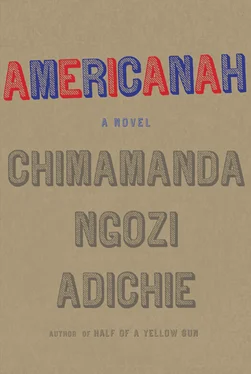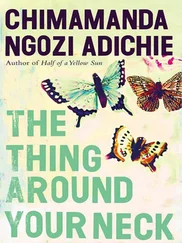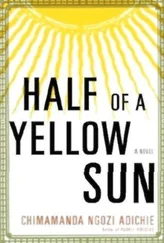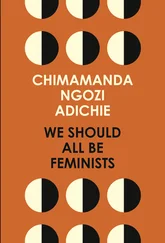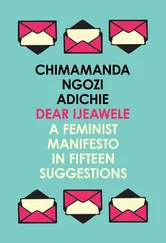“Darling, kedu ebe I no ?” His wife, Kosi, always began her calls to him with those words: Where are you? He never asked where she was when he called her, but she would tell him, anyway: I’m just getting to the salon. I’m on Third Mainland Bridge. It was as if she needed the reassurance of their physicality when they were not together. She had a high, girlish voice. They were supposed to be at Chief’s house for the party at seven-thirty p.m. and it was already past six.
He told her he was in traffic. “But it’s moving, and we’ve just turned into Ozumba Mbadiwe. I’m coming.”
On Lekki Expressway, the traffic moved swiftly in the waning rain and soon Gabriel was pressing the horn in front of the high black gates of his home. Mohammed, the gateman, wiry in his dirty white caftan, flung open the gates, and raised a hand in greeting. Obinze looked at the tan colonnaded house. Inside was his furniture imported from Italy, his wife, his two-year-old daughter, Buchi, the nanny Christiana, his wife’s sister Chioma, who was on a forced holiday because university lecturers were on strike yet again, and the new housegirl, Marie, who had been brought from Benin Republic after his wife decided that Nigerian housegirls were unsuitable. The rooms would all be cool, air-conditioner vents swaying quietly, and the kitchen would be fragrant with curry and thyme, and CNN would be on downstairs, while the television upstairs would be turned to Cartoon Network, and pervading it all would be the undisturbed air of well-being. He climbed out of the car. His gait was stiff, his legs difficult to lift. He had begun, in the past months, to feel bloated from all he had acquired — the family, the houses, the cars, the bank accounts — and would, from time to time, be overcome by the urge to prick everything with a pin, to deflate it all, to be free. He was no longer sure, he had in fact never been sure, whether he liked his life because he really did or whether he liked it because he was supposed to.
“Darling,” Kosi said, opening the door before he got to it. She was all made-up, her complexion glowing, and he thought, as he often did, what a beautiful woman she was, eyes perfectly almond-shaped, a startling symmetry to her features. Her crushed-silk dress was cinched tightly at the waist and made her figure look very hourglassy. He hugged her, carefully avoiding her lips, painted pink and lined in a darker pink.
“Sunshine in the evening! Asa! Ugo! ” he said. “Chief doesn’t need to put on any lights at the party, once you arrive.”
She laughed. The same way she laughed, with an open, accepting enjoyment of her own looks, when people asked her “Is your mother white? Are you a half-caste?” because she was so fair-skinned. It had always discomfited him, the pleasure she took in being mistaken for mixed-race.
“Daddy-daddy!” Buchi said, running to him in the slightly offbalance manner of toddlers. She was fresh from her evening bath, wearing her flowered pajamas and smelling sweetly of baby lotion. “Buch-buch! Daddy’s Buch!” He swung her up, kissed her, nuzzled her neck, and, because it always made her laugh, pretended to throw her down on the floor.
“Will you bathe or just change?” Kosi asked, following him upstairs, where she had laid out a blue caftan on his bed. He would have preferred a dress shirt or a simpler caftan instead of this, with its overly decorative embroidery, which Kosi had bought for an outrageous sum from one of those new pretentious fashion designers on The Island. But he would wear it to please her.
“I’ll just change,” he said.
“How was work?” she asked, in the vague, pleasant way that she always asked. He told her he was thinking about the new block of flats he had just completed in Parkview. He hoped Shell would rent it because the oil companies were always the best renters, never complaining about abrupt hikes, paying easily in American dollars so that nobody had to deal with the fluctuating naira.
“Don’t worry,” she said, and touched his shoulder. “God will bring Shell. We will be okay, darling.”
The flats were in fact already rented by an oil company, but he sometimes told her senseless lies such as this, because a part of him hoped she would ask a question or challenge him, though he knew she would not, because all she wanted was to make sure the conditions of their life remained the same, and how he made that happen she left entirely to him.

CHIEF’S PARTY WOULD bore him, as usual, but he went because he went to all of Chief’s parties, and each time he parked in front of Chief’s large compound, he remembered the first time he had come there, with his cousin Nneoma. He was newly back from England, had been in Lagos for only a week, but Nneoma was already grumbling about how he could not just lie around in her flat reading and moping.
“Ahn ahn! O gini? Are you the first person to have this problem? You have to get up and hustle. Everybody is hustling, Lagos is about hustling,” Nneoma said. She had thick-palmed, capable hands and many business interests; she traveled to Dubai to buy gold, to China to buy women’s clothing, and lately, she had become a distributor for a frozen chicken company. “I would have said you should come and help me in my business, but no, you are too soft, you speak too much English. I need somebody with gra-gra,” she said.
Obinze was still reeling from what had happened to him in England, still insulated in layers of his own self-pity, and to hear Nneoma’s dismissive question—“Are you the first person to have this problem?”—upset him. She had no idea, this cousin who had grown up in the village, who looked at the world with stark and insensitive eyes. But slowly, he realized she was right; he was not the first and he would not be the last. He began applying for jobs listed in newspapers, but nobody called him for an interview, and his friends from school, who were now working at banks and mobile phone companies, began to avoid him, worried that he would thrust yet another CV into their hands.
One day, Nneoma said, “I know this very rich man, Chief. The man chased and chased me, eh, but I refused. He has a serious problem with women, and he can give somebody AIDS. But you know these men, the one woman that says no to them is the one that they don’t forget. So from time to time, he will call me and sometimes I go and greet him. He even helped me with capital to start over my business after those children of Satan stole my money last year. He still thinks that one day I will agree for him. Ha, o di egwu , for where? I will take you to him. Once he is in a good mood, the man can be very generous. He knows everybody in this country. Maybe he will give us a note for a managing director somewhere.”
A steward let them in; Chief was sitting on a gilded chair that looked like a throne, sipping cognac and surrounded by guests. He sprang up, a smallish man, high-spirited and ebullient. “Nneoma! Is this you? So you remember me today!” he said. He hugged Nneoma, moved back to look boldly at her hips outlined in her fitted skirt, her long weave falling to her shoulders. “You want to give me heart attack, eh?”
“How can I give you heart attack? What will I do without you?” Nneoma said playfully.
“You know what to do,” Chief said, and his guests laughed, three guffawing, knowing men.
“Chief, this is my cousin, Obinze. His mother is my father’s sister, the professor,” Nneoma said. “She is the one that paid my school fees from beginning to end. If not for her, I don’t know where I would be today.”
“Wonderful, wonderful!” Chief said, looking at Obinze as though he was somehow responsible for this generosity.
Читать дальше
